| Area | Basin-wide/Regional |
| Topic | Tour: Fish Species of the Russian River, Native Fish Non-salmonids |
This photo shows an adult Sacramento sucker, a native species of the Russian River, after it has been measured and weighed during electrofishing above the Mirabel dam on the mainstem Russian River. Image provided courtesy of the Sonoma County Water Agency.
This photo shows a school of Sacramento suckers photographed under water near Digger Bend on the mainstem Russian River. This species is adapted to the warmer mainstem Russian River and because of different spawning habits is more resistant than salmon or steelhead to sediment impacts. Image provided courtesy of the Sonoma County Water Agency.
Bill Cox of the California Department of Fish and Game holds up a large, adult northern pikeminnow which was formerly known as the Sacramento squawfish. This species is native to the Russian River because the basin was formerly joined to the Sacramento River system. This species favors the warmer water of the mainstem Russian River and has been given an advantage by temperature increases. It can out-compete juvenile salmonids for food in elevated temperatures. Adult fish may eat young salmon and steelhead. Image provided courtesy of the Sonoma County Water Agency.
The northern pikeminnow is easily distinguishable from steelhead by its strong, purple lateral line, strongly forked tail and its slightly downturned mouth. A native Russian River tule perch is shown at lower right. Image provided courtesy of the Sonoma County Water Agency.
The Russian River tule perch is a native species that still inhabits the slower moving reaches of the mainstem Russian River. Image provided courtesy of the Sonoma County Water Agency.
The black fish is another inhabitant of the mainstem Russian River and is shown here after being captured during electrofishing above Mirabel dam. Image provided courtesy of the Sonoma County Water Agency.
The Pacific lamprey is another anadromous species that inhabits the Russian River. This adult fish has likely already spawned and was captured in the downstream migrant trap at Wohler Bridge. Juveniles are blind and called ammocoetes and live in stable pockets of sediment in side water areas of cool tributary streams. Photo provided courtesy of the Sonoma County Water Agency.
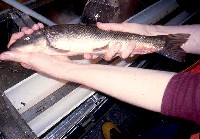 Click on image to enlarge (149K).
Click on image to enlarge (149K).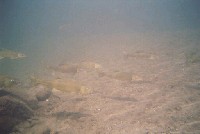 Click on image to enlarge (42K).
Click on image to enlarge (42K).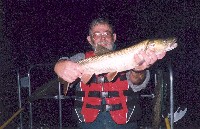 Click on image to enlarge (160K).
Click on image to enlarge (160K).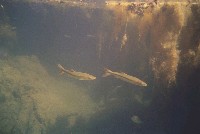 Click on image to enlarge (126K).
Click on image to enlarge (126K).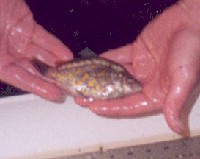 Click on image to enlarge (33K).
Click on image to enlarge (33K). Click on image to enlarge (174K).
Click on image to enlarge (174K).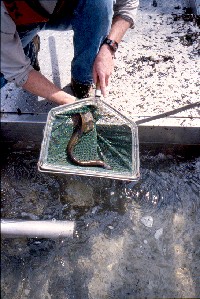 Click on image to enlarge (319K).
Click on image to enlarge (319K).
To learn more about this topic click Info Links
To view additional information (data source, aquisition date etc.) about this page, click Metadata
| www.krisweb.com |
